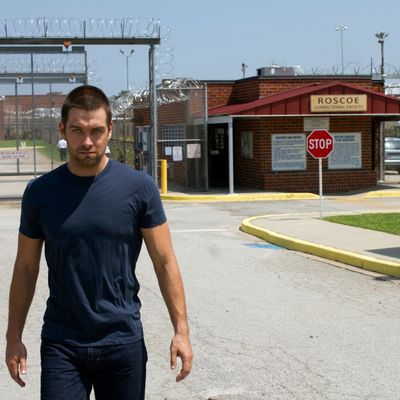
The new Cinemax series Banshee, which debuts tonight, is so plot-driven, so utterly dependent on “I can’t believe they did that!” twists, that I’m reluctant to describe any part of it in this opening paragraph. So I’ll just say that while it’s emphatically not a great show, it is an overheated yet intriguing one, driven more by visuals than words — and if you don’t mind that its gory action and soap-opera plots aren’t yet matched by dialogue and performance, it’s worth a look.
The story starts with our hero (Antony Starr) — who remains nameless and nearly silent throughout the pilot’s first half, though his name is Lucas Hood — being released from prison. We eventually get hints of what he was in for, but we don’t yet know what drives him — only that he has managed to elude mysterious assassins in a high-speed chase through New York City and then sped off on a stolen motorcycle toward Banshee, Pennsylvania, which feels like a mythical small town in an old Western. Banshee is a corrupt, fearful place ruled by a crime boss named Kai Proctor (Ulrich Thomsen), whose fingers are in everyone’s pie. (An intriguing wrinkle: Banshee is located in Amish country, and Kai was formerly part of the sect and takes great offense when some local bullies harass his elderly dad.) The local sheriff’s department, which includes a deputy played by Matt Servitto of The Sopranos, wants to clean the place up, so they’ve hired a new sheriff. Unfortunately, almost immediately after arriving in town, the poor bastard gets killed in a bar fight in the presence of our hero. What’s a strong, silent, merciless ex-con to do but call his forger buddy Job (Boon Lee) to hack into databases and substitute his picture for the dead man’s, put on his uniform and badge and start fighting evil?
In the immortal words of William Shakespeare, WTF??? Yes, this man of mystery who shouldn’t get within miles of any sort of criminal activity instantly assumes the identity of a lawman that was murdered by thugs in his presence. He helps the owner of the bar in which the fight occurred (the great Frankie Faison) bury the bodies of the victim and his killers. Then he strides around like Harrison Ford in righteous snit mode, beating up guys who are picking on the local Amish before he’s even been fitted for the dead man’s dress blues. Hood also tries to get back together with his main squeeze and former partner in crime Carrie Hopewell (Ivana Milicevec). This is complicated by the fact that she’s now married to the town’s prosecuting attorney, Gordon (Rus Blackwell), but she still fantasizes about having sex with Hood even as her husband is going down on her, so hey, there’s hope! Meanwhile, a truly terrifying villain known as Mr. Rabbit (Ben Cross) is lurking in the background of the story, a dark presence that’s all the more unnerving for being kept mostly in the narrative shadows.
Created by Jonathan Tropper and David Schickler and executive-produced by Alan Ball (True Blood), Banshee is a ludicrous series and knows it. It consists of one silly scene after another, all pitched at that super-hard-boiled, faux-noir level characteristic of so many graphic novels set in the underworld: so humorless that it’s kind of funny. A man gets shot through the hand in close-up, and you can see the rest of the room through the wound. The opening chase ends with an overturned double-decker bus roaring toward Hood like that train in Inception, but Hood escapes unscathed, and this event, which would be an international sensation in our reality, is presented here as just another crazy thing that happened in New York City. Hood is less a character than a presence: Clint Eastwood’s Man With No Name by way of Lee Marvin in Point Blank, a walking scowl with hints of pain and longing in his eyes. (Starr is an amazing physical presence, by the way; he’s got a great angry walk, and he poses in doors and windows nearly as well as Daniel Craig.) There were points in the first couple of episodes where I wanted to turn Banshee off because it wasn’t rising to the level of its promise. It’s an arty-trashy macho B movie in TV-series form, good but not good enough. And yet I intend to keep watching because the show is more brazenly cinematic than most, and because I need to know the characters’ secrets. As my late grandfather liked to say, that’s how they get ya.





